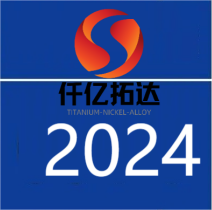ASTM B348: Understanding the Standard Specifications for Titanium Bars.
[ 信息发布:本站 | 时间:2024-03-13 | 浏览:492 ]
ASTM B348: Understanding the Standard Specifications for Titanium Bars.

ASTM B348 is the standard specification for titanium and titanium alloy bars. It covers various grades of commercially pure titanium and titanium alloys intended for applications such as aerospace, chemical processing, medical devices, and more. Here's an overview of the key aspects covered in ASTM B348:
-
Scope: The standard defines the scope of materials covered, including the chemical composition, mechanical properties, dimensions, tolerances, and testing requirements for titanium bars.
-
Material Grades: ASTM B348 includes several grades of titanium and titanium alloys, each designated by a numerical grade number (e.g., Grade 1, Grade 2, Grade 5, etc.). These grades differ in terms of composition, mechanical properties, and intended applications.
-
Chemical Composition: The standard specifies the chemical composition requirements for each grade of titanium and titanium alloy bars. This includes maximum limits for various elements such as iron, oxygen, nitrogen, carbon, hydrogen, and others.
-
Mechanical Properties: ASTM B348 outlines the mechanical property requirements for titanium bars, including tensile strength, yield strength, elongation, and hardness. These properties are crucial for ensuring the suitability of the material for specific applications and operating conditions.
-
Dimensions and Tolerances: The standard provides dimensional requirements and tolerances for titanium bars, including diameter, length, straightness, and surface finish. These specifications ensure uniformity and consistency in the manufacturing process and facilitate proper fit and assembly in end-use applications.
-
Testing and Inspection: ASTM B348 defines the testing and inspection procedures to verify compliance with the specified requirements. This may include methods for chemical analysis, mechanical testing, ultrasonic testing, visual inspection, and other relevant tests.
-
Certification and Marking: The standard outlines the requirements for product certification and marking, including identification of the material grade, heat number, manufacturer's name or trademark, and other relevant information.
-
Application Guidelines: While ASTM B348 provides general specifications for titanium bars, it is essential to consider specific application requirements and consult with relevant industry standards or guidelines for additional guidance.
Overall, ASTM B348 serves as a comprehensive standard for ensuring the quality, consistency, and reliability of titanium bars used in various industrial sectors. Adhering to these specifications helps manufacturers produce high-quality titanium products that meet the performance expectations of end-users.
